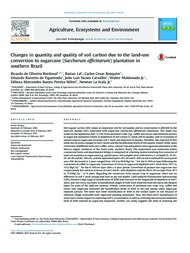Changes in quantity and quality of soil carbon due the land-use conversion to sugarcane (Saccharum officinarum) plantation in southern Brazil.
Changes in quantity and quality of soil carbon due the land-use conversion to sugarcane (Saccharum officinarum) plantation in southern Brazil.
Author(s): BORDONAL, R. DE O.; LAL, R.; RONQUIM, C. C.; FIGUEIREDO, E. B. DE; CARVALHO, J. L. N.; MALDONADO JUNIOR, W.; MILORI, D. M. B. P.; LA SCALA JUNIOR, N.
Publication year: 2017
Types of publication: Journal article
Unit: Embrapa Instrumentation
Observation
Some of Embrapa's publications are published as ePub files. To read them, use or download one of the following free software options to your computer or mobile device. Android: Google Play Books; IOS: iBooks; Windows and Linux: Calibre.
Access other publications
Access the Agricultural Research Database (BDPA) to consult Embrapa's full library collection and records.
Visit Embrapa Bookstore to purchase books and other publications sold by Embrapa.

